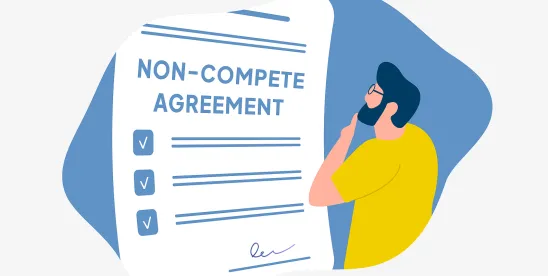Effective June 6, 2024, the state of Washington will further restrict the use of noncompetition agreements. This article provides background on the current law governing noncompetition agreements in Washington and walks through the new law’s changes.
Readers may also be familiar with the Federal Trade Commission’s (FTC’s) latest noncompete rule, which goes into effect on September 4, 2024. While that federal regulation is currently being challenged in court, Washington employers should be mindful that the state rule explained here will go into effect in June regardless of the FTC rule’s status.
IN DEPTH
BACKGROUND ON THE CURRENT LAW
In general, Washington’s state code sets out three main rules regarding noncompetition covenants:
- Under the “layoff rule,” “noncompetition covenant[s]” are void and unenforceable if the employee who signed them is terminated as a result of a layoff.
- Under the “18-month rule,” noncompetition covenants are presumed unreasonable if they have a duration exceeding 18 months after termination of employment, unless the presumption is rebutted by clear and convincing evidence that the duration is necessary to protect the party’s business or goodwill.
- Under the “provisions rule,” if a noncompetition covenant requires a Washington-based employee or independent contractor to adjudicate the covenant outside the state of Washington, then the provisions in the covenant are void and unenforceable to the extent they deprive the worker of Washington Revised Code Chapter 49.62’s benefits.
The new law, outlined in Substitute Senate Bill 5935, affects both the substance of these rules and the procedures for enforcing them. Below, we walk through the three key changes: the substantial revision of the provisions rule, the general expansion of the statute’s prohibitions and the narrowing of the statute’s exceptions.
THE PROVISIONS RULE
As outlined above, the provisions rule originally only targeted provisions in certain covenants – i.e., covenants with a mandatory non-Washington forum selection clause.
Under the new rule, a provision in a noncompetition covenant is void and unenforceable:
- If the covenant requires the employee or independent contractor to adjudicate a noncompetition covenant outside of Washington;
- To the extent it deprives the employee or independent contractor of the protections or benefits of Chapter 49.62; or
- If it allows or requires the application of choice of law principles or the substantive law of any jurisdiction other than Washington state.
The two key changes here are the insertion of the word “or” and the new third subsection. Both of these revisions expand the reach of the provisions rule.
THE EXPANSION OF THE STATUTE
The new law also expands Washington’s rules on noncompetition covenants in several other ways:
- Previously, one could only bring a cause of action on pre-2020 covenants if the covenant was being enforced. Under the new rules, one can support a cause of action for a pre-2020 covenant if it is being enforced or if it is being “explicitly leveraged.”
- Previously, the statute did not dictate how courts should interpret it. The new rules, however, instruct courts to apply a “liberal construction.”
- Previously, the statue did not contain examples of “noncompetition covenants.” Under the new rules, the statute offers one example of a noncompetition covenant: “an agreement that directly or indirectly prohibits the acceptance or transaction of business with a customer.” Thus, a customer nonsolicit clause that prohibits the acceptance or transaction of business with a customer would qualify as a noncompetition covenant under the new rules.
The new rules also expand the procedural reach of the statute. The statute now clarifies that it preempts not only conflicting tort, restitution and contract laws but also “contract principles relating to discharge by assent or alteration.” And while the statute previously limited its enforcement to just the covenant’s parties, that language has now been removed. Similarly, even though the statute previously only made covenants void “against the employee,” that language has also been removed. This suggests that employers can now file lawsuits under the statute.
THE NARROWING OF THE EXCEPTIONS
The new law narrows several exemptions and exceptions to the statute.
As written, the current statute exempts the following from the definition of “noncompetition covenant”:
- Nonsolicitation agreements;
- Confidentiality agreements;
- Covenants prohibiting the use or disclosure of trade secrets or inventions;
- Covenants entered into by a person purchasing or selling the goodwill of a business or otherwise acquiring or disposing of an ownership interest; and
- Covenants entered into by a franchisee when the franchise sale complies with Washington Revised Code § 19.100.020(1).
The new rules narrow two of these exemptions. First, the “goodwill or ownership” exemption is now limited only to where “the person signing the covenant purchases, sells, acquires, or disposes of an interest representing one percent or more of the business.”
Second, the “nonsolicitation agreement” exemption has been significantly narrowed. Previously, the phrase “nonsolicitation agreement” only applied to agreements that prohibited post-termination solicitations by an employee (A) of any employee of the employer to leave the employer or (B) of any customer of the employer to cease or reduce the extent to which it is doing business with the employer. The new rules swap the word “customer” with the phrase “current customer” in subsection (B). The import is this: An agreement that prohibits the solicitation of an employer’s former customers is not a nonsolicitation agreement and therefore could potentially qualify as a prohibited noncompetition agreement.
There is one last change to note. Previously, the statute made noncompetition covenants void and unenforceable unless the employer disclosed the terms of the covenant in writing to the prospective employee no later than the time of acceptance of the offer. The new statute tightens the timeframe: The employer must disclose the terms of the covenant in writing no later than the time of “the initial oral or written acceptance of the offer.”
Henry A. Leaman also contributed to this article.





 />i
/>i

